VOA标准英语2008年-Stamps Tell Stories and Keep History Alive(在线收听)
By Faiza Elmasry
Burlingame, CA
17 June 2008
The first postage stamp in history was issued in Great Britain in 1840. In the years since then, tens of thousands of different designs have been issued by the world's nations, and tens of thousands of people have started to collect them. Even in the age of e-mail, stamp collecting remains a popular hobby.
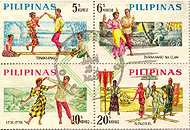 |
| Stamp collector Don Peterson says he has always loved the stamps issued by the Philippines because of their beauty |
Don Peterson, 63, started collecting stamps when he was 10. In his 20s, he says, he was attracted to the stamps issued by the Philippines because of their beauty. He says he usually does research about the stamps, collects what's available, then starts chasing the missing stamps to complete his collection.
"You have to look very hard for them all over the world because they're not in one spot," he says. "It is frustrating when you can't find something, but when you do find something, it's exhilarating joy."
Persistence and patience, Peterson says, are what stamp collectors need, since finding those missing stamps can take decades.
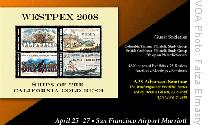 |
| Westpex in California is one of the 35 major shows in the United States |
"I have a collection: the postal history of the Spanish Philippines from 1854 to 1898," he says. "I started collecting postal history, which are old envelopes, about 20 years ago, buying each piece, one at a time, occasionally, somebody giving me something. And I've been lucky, finding a few covers [envelopes] here and there."
Like many other philatelists, Peterson exhibits his collections along with a written narration that tells the story behind them at stamp competitions. This year, he won a gold medal at the Westpex stamp show in Burlingame, California.
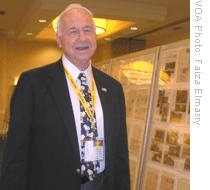 |
| Westpex's George Shalimoff says dozens of national and international dealers come to their show to buy and sell stamps and envelopes |
"Westpex here in California is one of the 35 major shows in the United States," says George Shalimoff, Vice Chairman of Westpex, a non-profit group that promotes stamp collecting as a hobby. "3000 people may come through the show."
Shalimoff says national and international dealers come to the show to buy and sell stamps and "covers" or envelopes to collectors.
A youth program at Westpex introduces young people to the hobby of collecting stamps. "We have people who even give seminars to teachers, so the teachers can use the history of the postage stamps as part of the learning process," Shalimoff says. "We give tours of the exhibits and of the show, so people can get a general idea what a stamp exhibition is all about."
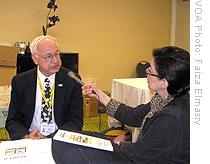 |
| George Shalimoff tells VOA's Faiza Elmasry stamp collecting can be an expensive hobby |
Stamp competitions, Shalimoff says, offer an opportunity to meet other collectors who are taking their hobby seriously.
"Some people have spent hundreds of thousands of dollars," he says. "Last year, for example, we had a collection here which was the finest collection of the United States material ever assembled. It had to be worth more than $10 million. It was owned by a very wealthy man. Of course, not everyone could do this, but to see it, to have it displayed, it's your one chance in a lifetime to see this kind of material."
Beginners come to the show, he says, not only to see such outstanding collections, but to also learn about the criteria the judges apply in evaluating competing collections.
"The criteria for judging includes rarity to begin with, the development of a story, the presentation, how nicely it is displayed," he says, adding it is important to develop a theme. "The theme can be one particular issue. It can be a period of time. It can be a particular subject, but you're trying to tell a story."
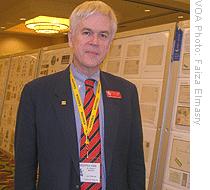 |
| Philatelic judge Peter McCann says stamp collecting is a universal hobby |
Peter McCann is a philatelic judge who has been evaluating stamp collections in national and international exhibitions for more than 20 years.
"We have a large global organization that regulates how people exhibit and show things," he says. "It's very similar all over the world. It's a hobby that we collectors and judges can talk to anybody in the world [about], even if we don't speak the same language. We can talk stamps."
McCann says he finds stamp collecting an interesting hobby that anyone, anywhere, at any age can pursue and enjoy.
"What you do is you go out and find stamps that you like or stamps that are on envelopes that are used," he says. "Collect what you like and what you think is interesting and that you get some fun from. I found over the years, that people tend to like one country, or one type of stamps more than another. They start to specialize and they buy more materials: stamps from Colombia, or stamps from Paraguay, or stamps from Canada and they focus on it."
Westpex's George Shalimoff says although people are now increasingly exchanging messages via e-mail, stamp collecting is not going to fade away. In fact, he says, computer technology helps collectors search, collect and present their collections in new and innovative ways.